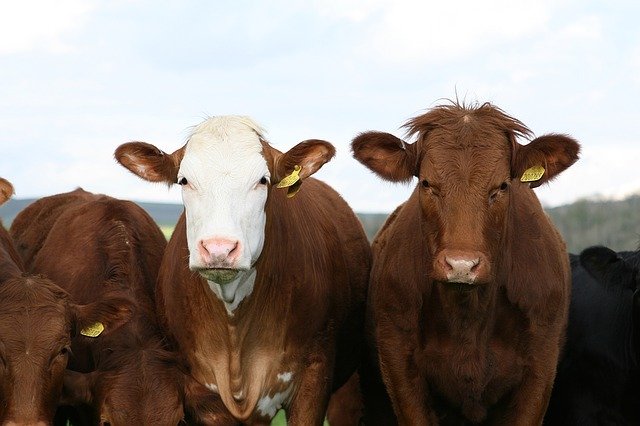New York, NY - February 8, 2019 - Governor Andrew M. Cuomo today announced that $18.4 million in grant funding is available to help New York livestock farms implement water quality protection projects. The funding will be provided through the final round of the Concentrated Animal Feeding Operation Waste Storage and Transfer System Program, a $50 million program launched in 2017. The program is part of the Governor's Clean Water Infrastructure Act, which would double under the 2019-2020 Executive Budget proposal to $5 billion. The application period is currently open and closes April 16, 2019.
"New York's farms are integral to our economy, and it is critical they get the resources necessary to thrive," Governor Cuomo said. "This funding will not only help our livestock farms maintain the cleanest and safest operations possible, it will also ensure our state's water and natural resources are protected and preserved for generations to come."
"This funding will support critical projects to protect our waterways and keep our resources clean and safe," said Lieutenant Governor Kathy Hochul. "We are continuing to invest in programs to support our farmers and grow the industry."
The program, administered by the NYS Department of Agriculture and Markets, funds projects that will allow livestock farms to better manage and store nutrients, such as manure, and to protect ground water and nearby waterways. These grants will help farmers meet New York State Department of Environmental Conservation requirements and support the state's comprehensive effort to reduce the frequency of harmful algal blooms in upstate waterbodies. Since the program's launch, nearly $32 million has been awarded to 89 farms.
County Soil and Water Conservation Districts can apply for Round 3 of the Waste Storage and Transfer System program on behalf of eligible farmers. The maximum award amount per proposal is $385,000, which includes funding for engineering and construction expenses. Grants will help CAFO-permitted farms offset the cost of manure storage construction, site preparation, and associated best management practices.
New York State has more than 500 CAFO farms, most of which are dairy farms with 300 or more cows. CAFOs can also include associated livestock operations such as beef, poultry and equine farms.
The application and additional information are available on the Department of Agriculture and Markets' website. The deadline to apply is April 16, 2019. A Department of Agriculture and Markets and DEC informational document on the importance of manure storage facilities to maintain New York State's environmental standards can be found here.
State Agriculture Commissioner Richard A. Ball said, "We thank the Governor for supporting our farmers with these funds. Proper storage and spread of manure help enrich our soils while protecting our waterways, improving our land and water, the natural resources we need to sustain our farms and our communities."
Department of Environmental Conservation Commissioner Basil Seggos said, "Today's grants further bolster Governor Cuomo's commitment to protecting our drinking water and aquatic ecology while also supporting the bottom lines of New York's farmers. This funding will continue to assist farmers in reducing fertilizer costs while helping to abate the nutrients that contribute to harmful algae blooms in our lakes and waters."
New York State Soil and Water Conservation Committee Chair Dale Stein said, "With this third round of the CAFO manure storage grant program now available, approximately $18 million will greatly help our farms to meet the storage needs as required by law. Our dairy farms, in particular, are facing terrible economic hardship today and without this grant money, they would not be able to meet the requirements for their farms. I encourage all farms that are eligible to work with their Districts to apply for this third and final round of funding."
Assembly Member Donna Lupardo, Chair of the Assembly Agriculture Committee, said, "Maintaining and protecting our natural resources must be a part of the ongoing operations and sustainability of New York's farms. This funding will help farmers preserve our state's water supply while improving their own operations for the next generation. Given the role agriculture plays in our state's economy, it's important that we make wise investments to support it."
The Clean Water Infrastructure Act of 2017 invested a record $2.5 billion in critical water infrastructure across New York State. In his 2019-20 Executive Budget, Governor Cuomo proposed an additional $2.5 billion, doubling the funding to support clean water projects. The historic investment in drinking water infrastructure, wastewater infrastructure, and source water protection will enhance community health and wellness, safeguard the state's most important water resources, and create jobs. Funding for projects will prioritize regional and watershed level solutions and incentivize consolidation and sharing of water and wastewater services.
In 2018, Governor Cuomo directed DEC to implement his $65 million, four-point initiative to aggressively combat harmful algal blooms, or HABs, in New York. HABs threaten the recreational use of lakes important to upstate tourism, as well as sources of drinking water. DEC chose 12 waterbodies vulnerable to algal blooms, that are also critical sources of drinking water and vital tourism drivers, as priority waterbodies. After four regional summits and with input from national, state and local experts, and our state agency partners, we developed action plans specific to the ecology of these waterbodies. The lessons learned from the implementation of these plans is helping DEC to identify solutions to help impacted waterbodies across the state.










